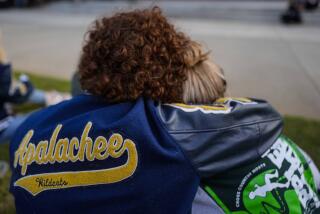Teen Gets Life Sentence for Killing 3 at High School
- Share via
PADUCAH, Ky. — As some of his victims bore emotional witness, a Kentucky teenager was sentenced Wednesday to life in prison for a high school shooting rampage last year that killed three and wounded five.
Michael Carneal, 15, who pleaded guilty but mentally ill in October, will be eligible for parole in 25 years. He opened fire on Dec. 1, 1997, on fellow students participating in a morning prayer meeting at Heath High School.
Carneal received the maximum sentence allowed for a juvenile, but one of his victims wished Kentucky law allowed harsher punishment.
“I would love to see you get the death penalty, but I know you can’t,” said Kelly Hard, who survived the shooting with a relatively minor injury. “You gave them the death penalty. . . . They didn’t choose to live or die. You chose death.”
Hard, who saw one of her best friends die and another left paralyzed, said she is tormented by the carnage. “My little scar isn’t much, but every time I see it, it reminds me. . . . I hope you’re suffering as much as the rest of us.”
Carneal sat with his head bowed, raising it only when two of his former classmates asked him to look at them.
“I wanted Michael to look at me,” said Missy Jenkins, who was wounded in the shooting and spoke from her wheelchair. Carneal looked up with tears in his eyes.
“I want you to know I’m paralyzed,” Jenkins continued. “I have no hard feelings against you. I can live this way. It will be hard, but I can do it. I just wanted you to know that.”
Sabrina Steger, whose daughter Casey was killed, said families are suffering a life sentence of their own.
“Seeing Casey on a stretcher and hearing Becky’s screams at her sister’s murder makes sleep something we want to avoid,” said Steger, one of five parents to ask that Carneal receive the maximum sentence. “We are sentenced to a life of grief without parole, and it’s very hard labor.”
McCracken Circuit Judge Jeff Hines blotted away tears during statements by parents, victims and students. “I wish there was something I could say or do,” he said. “We may never know why. I wish I could give you an answer, but I can’t.”
More to Read
Sign up for Essential California
The most important California stories and recommendations in your inbox every morning.
You may occasionally receive promotional content from the Los Angeles Times.










